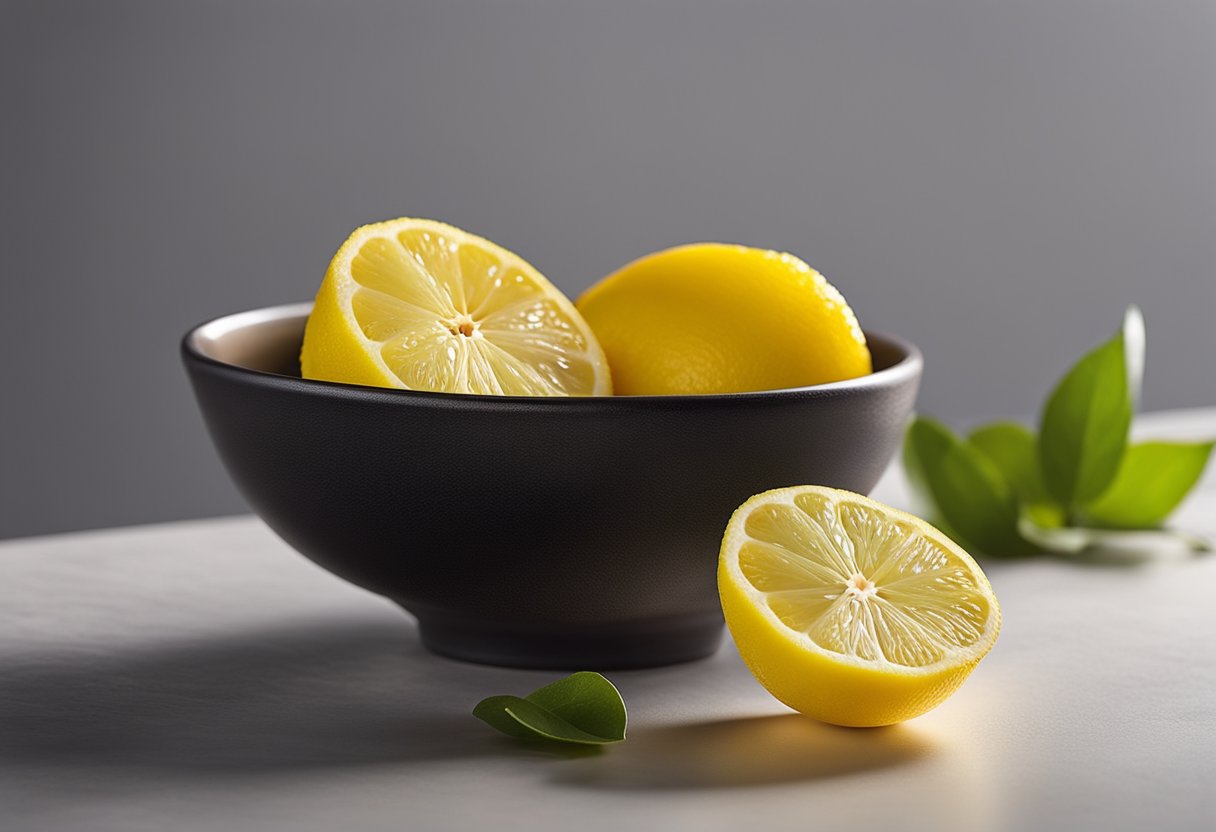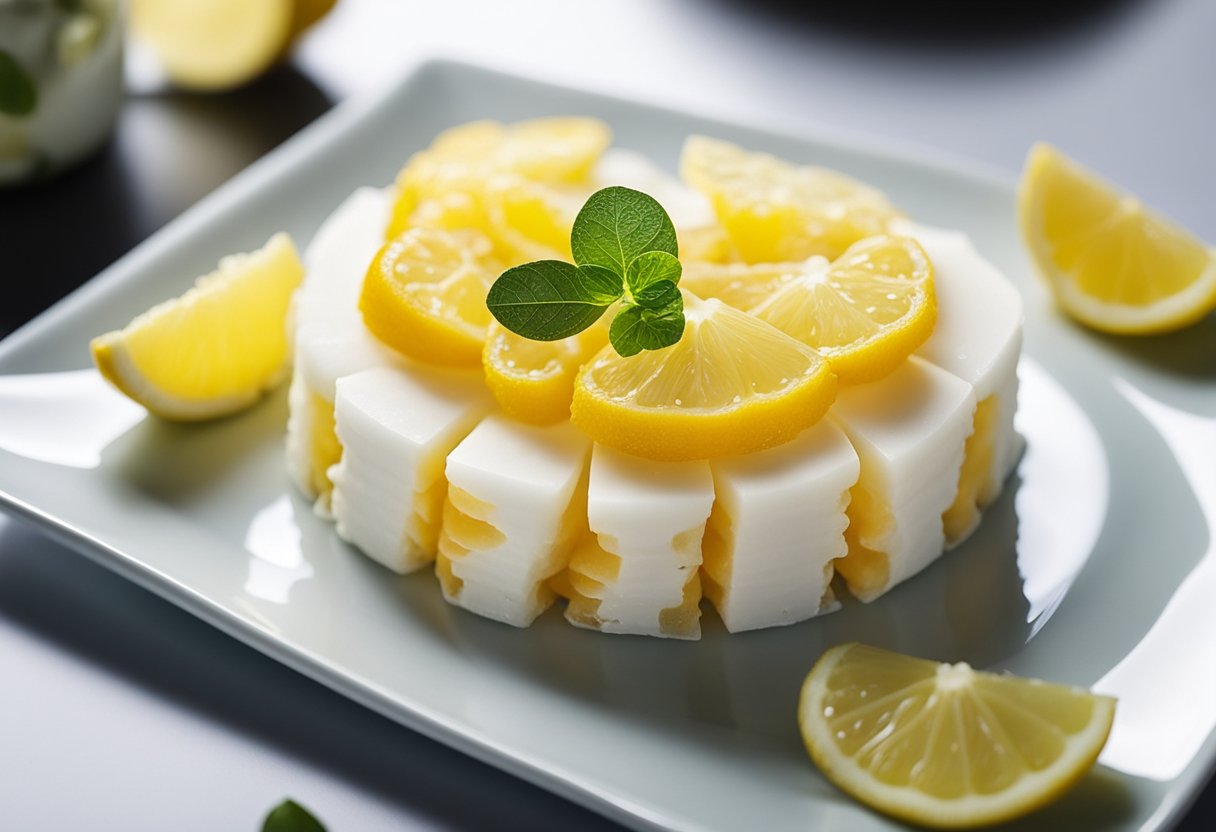Yuzu is a citrus fruit that has been gaining popularity in recent years, particularly in the culinary world. Its unique flavor and aroma have made it a sought-after ingredient in many dishes and drinks. But what exactly does yuzu taste like?

Yuzu has a flavor profile that can be described as a combination of lemon, mandarin orange, and grapefruit. It is tart and acidic, with a sharpness that is not as astringent as grapefruit or as sour as a lemon. The fruit also has a strong floral scent that adds to its appeal.
Overall, yuzu is a versatile ingredient that can be used in a variety of dishes, from savory to sweet. Its distinct flavor and aroma make it a favorite among chefs and food enthusiasts alike. If you’re looking to add some zest to your cooking, yuzu is definitely worth trying out.
Key Takeaways
- Yuzu is a citrus fruit with a unique flavor profile that combines lemon, mandarin orange, and grapefruit.
- Its sharp, tart taste and strong floral scent make it a versatile ingredient in both savory and sweet dishes.
- Yuzu’s popularity in the culinary world continues to grow, making it a must-try ingredient for food enthusiasts.
Understanding Yuzu
Yuzu is a citrus fruit that originated in Japan and is widely used in Asian cuisine. It is a small, round fruit that resembles a small grapefruit with a bumpy exterior. The yuzu fruit is typically yellow or green in color and has a distinct aroma that is both tangy and refreshing.
Yuzu is a rare fruit that is not commonly found in most grocery stores. It is grown on a tree called the Ichang papeda, which is a type of papeda tree. The tree is native to China and is grown in Japan, Korea, and other parts of Asia.
The taste of yuzu is often described as a mix of lemon, lime, grapefruit, and mandarin orange. It has a bright, citrusy flavor with a powerful aroma that is both tangy and refreshing. Yuzu is also known for its tartness, which makes it a popular ingredient in many dishes.
Yuzu is a versatile ingredient that can be used in a variety of ways. It is commonly used in sauces, dressings, marinades, and desserts. Yuzu juice can also be used as a substitute for lemon or lime juice in many recipes.
Overall, yuzu is a unique and flavorful fruit that is highly valued in Asian cuisine. Its distinct taste and aroma make it a popular ingredient in many dishes, and its rarity makes it a sought-after ingredient for chefs and home cooks alike.
Taste Profile of Yuzu

Yuzu is a citrus fruit that has a complex flavor profile that combines the flavors of lemon, lime, grapefruit, and mandarin orange. It has a bright, citrusy flavor that is both tangy and refreshing. Yuzu has a powerful aroma that is both tangy and floral.
Compared to other citrus varieties, yuzu has a very sour taste. It tastes like a mix between a tangy lemon, bitter grapefruit, and sweet orange. Its tart flavor profile is underscored with hints of floral and herbal notes.
Fresh yuzu has a citrusy, tart flavor that could best be described as a mashup of grapefruit, lemon, and mandarin.
It isn’t as astringent as grapefruit or as sour as a lemon, and it’s possible to eat the fruit’s flesh out of hand. However, this isn’t the most popular use for yuzus as they have a lot of large seeds and not a lot of juice.
Yuzu is used in both sweet and savory dishes. Its unique flavor and aroma make it a popular ingredient in Japanese cuisine, where it is often used in dressings, marinades, and sauces. It is also used in cocktails, desserts, and baked goods.
In summary, yuzu has a complex flavor profile that combines the flavors of lemon, lime, grapefruit, and mandarin orange. It has a bright, citrusy flavor that is both tangy and refreshing, with hints of floral and herbal notes. Compared to other citrus varieties, yuzu is very sour and has a powerful, tangy aroma.
Aroma of Yuzu

Yuzu is a citrus fruit that is well-known for its strong and unique aroma. As I have experienced, the scent of yuzu is like a mix of lemon, mandarin orange, lime, and grapefruit. It has a refreshing and invigorating fragrance that can awaken the senses.
The aroma of yuzu is quite strong and can be overpowering if used in excess. However, when used in the right amount, it can add a beautiful and aromatic touch to a dish.
Yuzu is perfect for creating balance in a dish, as it adds aroma and flavor without being too strong or overpowering.
Yuzu has a floral and herbal aroma that can remind you of a blooming meadow, with sun-soaked petals and dew-kissed leaves. Its unique fragrance brings to mind memories of days gone by, innocence, and freedom.
As such, yuzu is often used in aromatherapy and scented candles to create a calming and relaxing atmosphere.
In summary, the aroma of yuzu is a mix of lemon, mandarin orange, lime, and grapefruit, with a refreshing and invigorating fragrance. It has a strong and unique scent that can add a beautiful and aromatic touch to a dish when used in the right amount.
Yuzu’s floral and herbal aroma can also be used in aromatherapy and scented candles to create a calming and relaxing atmosphere.
Culinary Uses of Yuzu
Yuzu is a versatile citrus fruit that can be used in a variety of culinary applications. In Japanese cuisine, it is often used as a substitute for lemon or lime juice and can add a unique flavor to dishes. Here are some of the most common culinary uses of yuzu:
- Juice: Yuzu juice is often used in dressings, sauces, and marinades. It has a tart and tangy flavor that can add a bright and refreshing element to savory dishes.
- Zest: The zest of the yuzu fruit is often used to add flavor to desserts, such as cakes and pies. It can also be used as a garnish for savory dishes, adding a pop of color and flavor to the plate.
- Yuzu Kosho: Yuzu kosho is a condiment made from yuzu zest, chili peppers, and salt. It is often used as a seasoning for fish, sashimi, and other savory dishes.
- Sauce: Yuzu sauce can be made by combining yuzu juice, soy sauce, and honey. It can be used as a marinade for meat or as a dressing for salads.
- Marmalade: Yuzu marmalade is a thick, sweet spread that can be used on toast or as a topping for desserts.
- Ponzu: Ponzu is a sauce made from yuzu juice, soy sauce, and vinegar. It is often used as a dipping sauce for sushi or as a dressing for salads.
- Cocktails: Yuzu juice can be used to add a citrusy flavor to cocktails. It pairs well with gin, vodka, and tequila.
Overall, yuzu is a versatile fruit that can be used in a wide range of dishes. Its unique flavor and aroma can inspire chefs to experiment with new recipes and flavor combinations. Yuzu can be found in Asian markets or in some specialty products in California.
It is often used in Japanese cuisine and can add a bitter, astringent flavor to dishes. When storing yuzu, it is best kept in the refrigerator and used within a few days of purchase.
Yuzu in Drinks
Yuzu is a versatile citrus fruit that can be used in a variety of drinks. Its unique flavor profile makes it a popular ingredient in cocktails, mocktails, and other beverages.
One of the most popular drinks that feature yuzu is the Yuzu Sour cocktail. This cocktail is a refreshing and citrusy drink that is perfect for warm weather. It is made with yuzu juice, vodka or gin, and simple syrup.
The yuzu juice gives the cocktail a tangy and slightly bitter flavor that is balanced out by the sweetness of the simple syrup.
Yuzu is also commonly used in Japanese sake cocktails. One popular sake cocktail that features yuzu is the Yuzu Highball. This drink is made with yuzu juice, soda water, and sake. The yuzu juice adds a citrusy and refreshing flavor to the sake, making it a perfect drink for a hot summer day.
In addition to cocktails, yuzu can also be used in non-alcoholic drinks. Yuzu tea is a popular non-alcoholic drink in Japan that is made with yuzu juice, honey, and hot water.
This drink is perfect for cold winter days as it has a warming effect on the body. Yuzu can also be used in lemonades and other fruit juices to add a unique citrusy flavor.
Overall, yuzu is a versatile ingredient that can be used in a variety of drinks. Its unique flavor profile adds a refreshing and citrusy taste to cocktails and other beverages.
Yuzu in Desserts

I absolutely love using yuzu in desserts. Its unique flavor profile adds a refreshing and tangy twist to traditional sweet treats. Here are some ways I like to use yuzu in desserts:
Cakes and Pies
Yuzu can be used in cakes and pies to add a citrusy flavor. I like to add yuzu to cheesecakes, pound cakes, and lemon tarts. Yuzu can be used in place of lemon or lime in most cake and pie recipes. It pairs well with vanilla, honey, and ginger flavors.
Ice Cream and Sorbet
Yuzu is perfect for making ice cream and sorbet. Its tart flavor cuts through the sweetness of the cream and sugar, creating a well-balanced dessert. I like to make yuzu sorbet and serve it with fresh berries. Yuzu ice cream is also delicious and can be served with a warm fruit compote.
Cream and Sugar
Yuzu can be used to flavor whipped cream and sugar. I like to add yuzu to whipped cream and serve it with fresh fruit or use it to top a cake. Yuzu sugar can be made by mixing yuzu zest with granulated sugar. The sugar can be used to sweeten tea or coffee, or sprinkled on top of fresh fruit.
Overall, yuzu is a versatile ingredient that can be used in a variety of desserts. Its unique flavor profile adds a refreshing twist to traditional sweet treats.
Yuzu’s Popularity

Yuzu has been gaining popularity in recent years, especially in the United States. In November and December, when the fruit is in season, it can be found in specialty stores and Asian markets across the country.
California is one of the largest producers of yuzu in the United States, but the fruit is also imported from East Asia, particularly from Japan.
Yuzu’s popularity is due in part to its unique flavor. The fruit has a tart and citrusy taste, often described as a combination of mandarin orange, lemon, and grapefruit.
Its floral and herbal notes give it a distinct and refreshing taste that is unlike any other citrus fruit. This versatility makes it a popular ingredient in both sweet and savory dishes.
In East Asia, yuzu has been used for centuries in traditional medicine and cuisine. In Tibet, the fruit is believed to have healing properties and is used to treat respiratory illnesses.
In Japan, it is commonly used to flavor fish, noodles, and vegetables, and is a key ingredient in ponzu sauce. Yuzu is also used to make yuzu tea, yuzu marmalade, and yuzu vinegar.
Overall, yuzu’s popularity is on the rise, and it’s not hard to see why. Its unique flavor, versatility, and health benefits make it a favorite among chefs and foodies alike.
Frequently Asked Questions

Where can I buy yuzu fruit?
Yuzu fruit is native to East Asia, but it can also be found in some specialty stores and online markets. You can also find yuzu juice, yuzu paste, and yuzu seasoning in some grocery stores and online shops.
What are the similarities and differences between yuzu and lemon?
Yuzu and lemon are both citrus fruits, but yuzu has a more complex flavor profile than lemon. Yuzu has a distinct tangy flavor with floral and herbal notes, while lemon has a more straightforward acidic taste. Additionally, yuzu is smaller than lemon, has a rougher texture, and has a thicker rind.
What is the taste of yuzu juice?
Yuzu juice has a tart and tangy flavor with a hint of sweetness. It is often used as a seasoning or marinade in Japanese cuisine and is a popular ingredient in ponzu sauce.
What dishes is yuzu sauce commonly used in?
Yuzu sauce is commonly used in Japanese cuisine and is often paired with seafood dishes. It can also be used as a dressing for salads or as a glaze for grilled meats.
What does yuzu fruit look like?
Yuzu fruit is small and round with a bumpy, rough texture. It is typically yellow or green in color and has a thick rind.
What flavors pair well with yuzu?
Yuzu pairs well with a variety of flavors, including soy sauce, ginger, garlic, and sesame oil. It can also be used to add a citrusy twist to sweet dishes like desserts and cocktails.







